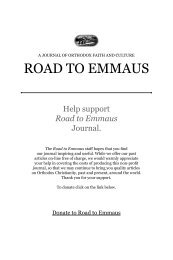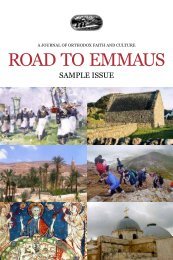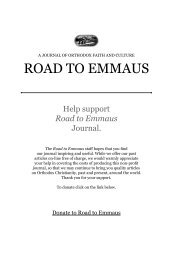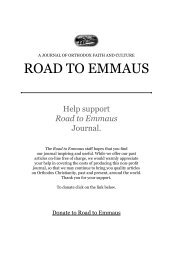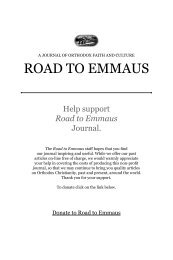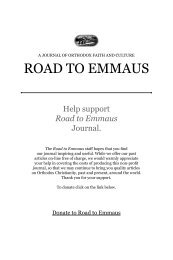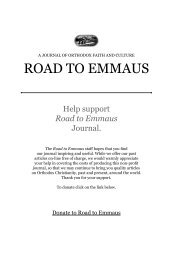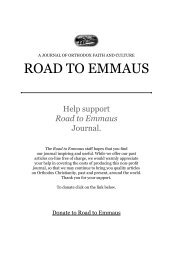Banished Faith: The Exile of Christian Pontus - Road to Emmaus ...
Banished Faith: The Exile of Christian Pontus - Road to Emmaus ...
Banished Faith: The Exile of Christian Pontus - Road to Emmaus ...
You also want an ePaper? Increase the reach of your titles
YUMPU automatically turns print PDFs into web optimized ePapers that Google loves.
BANISHED FAITHfrom age 15 <strong>to</strong> 50. <strong>The</strong> rule <strong>of</strong> Ot<strong>to</strong>man centuries held that <strong>Christian</strong>s couldnot bear arms, and they were relegated instead <strong>to</strong> unarmed “labor battalions,”that broke s<strong>to</strong>nes and built roads under such dismal conditions thatfew returned alive. 1 Many emigrated <strong>to</strong> Russia and Georgia <strong>to</strong> avoid conscription.Those who deserted the forced-labor gangs were unable <strong>to</strong> returnhome without endangering their families and villages, and so <strong>of</strong>ten joinedpartisan bands hiding in the mountains. As the war dragged on, the sultan’spower weakened daily, with Mustafa Kemal Ataturk, the Young Turks, andvarious nationalist groups waiting in the wings <strong>to</strong> <strong>to</strong>pple the Ot<strong>to</strong>mandynasty. Bands <strong>of</strong> Turkish bandits and ex<strong>to</strong>rtioners arose, and using themobilization law as a weapon, they threatened <strong>Christian</strong> villages, whosemen had not yet served in the army, with exposure and imprisonmentunless they paid heavy bribes.One such thug was Topal Osman 2 , a Turk from Gerasus, who organizedthe tseteler, gangs <strong>of</strong> armed bandits who plundered and burnt <strong>Christian</strong>homes and villages along the Black Sea coast for over a decade. After an initialappointment <strong>to</strong> the National Assembly when the Young Turks came <strong>to</strong>power, Osman was hung for participating in a failed conspiracy againstAtaturk, but in the years preceding his death, he and his men were thescourge <strong>of</strong> <strong>Pontus</strong>’ <strong>Christian</strong>s. In the village <strong>of</strong> Khabak, the tseteler <strong>to</strong>okmoney from the Greeks “<strong>to</strong> keep their sons out <strong>of</strong> prison,” and then massacredthe entire <strong>Christian</strong> population. In Havza, they put the villagers insidethe village church and burnt them alive. Only on the eastern end <strong>of</strong> theTurkish Black Sea coast were the <strong>Christian</strong>s protected, as we shall see later,through the policies <strong>of</strong> Bishop Chrysanthos <strong>of</strong> Trebizond.Massacres and forced marches <strong>of</strong> Armenian, Syriac and Orthodox<strong>Christian</strong>s in and near Turkey had been initiated in the previous century,but for the Pontians, persecution <strong>of</strong> the Armenians was felt only in 1915,when local Armenians were targeted. <strong>The</strong> Pontian Greeks’ own Golgothabegan in February <strong>of</strong> 1916, when allied imperial Russian troops occupied theeastern Black Sea coast during World War I, and the Ot<strong>to</strong>man government,fearing collaboration with the tsarist forces, wreaked retribution onTurkey’s native Greeks. Until the final displacement <strong>of</strong> the Greeks in 1923,however, even the harshest government policy could not eradicate the ties1 For centuries previously, <strong>Christian</strong>s under the Ot<strong>to</strong>mans were not allowed <strong>to</strong> do military duty, but wereinstead assessed heavy additional taxes <strong>to</strong> equip the empire’s all-Muslim army.Domna Koykalidou.2 Topal Osman: Feridun Zade Osman Aga, nicknamed “Topal,” meaning, “the cripple.”9



